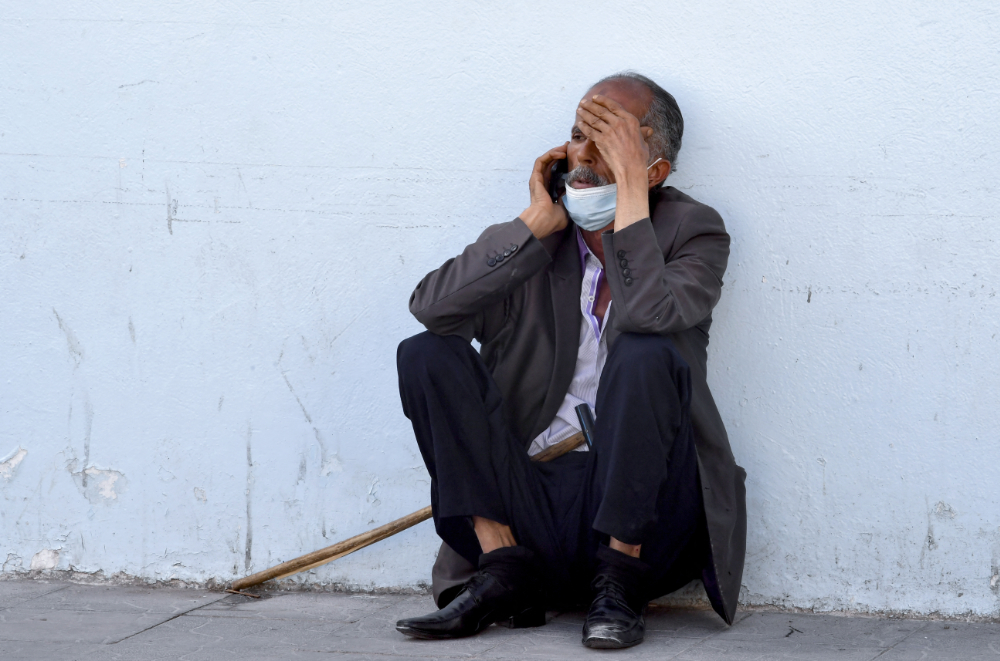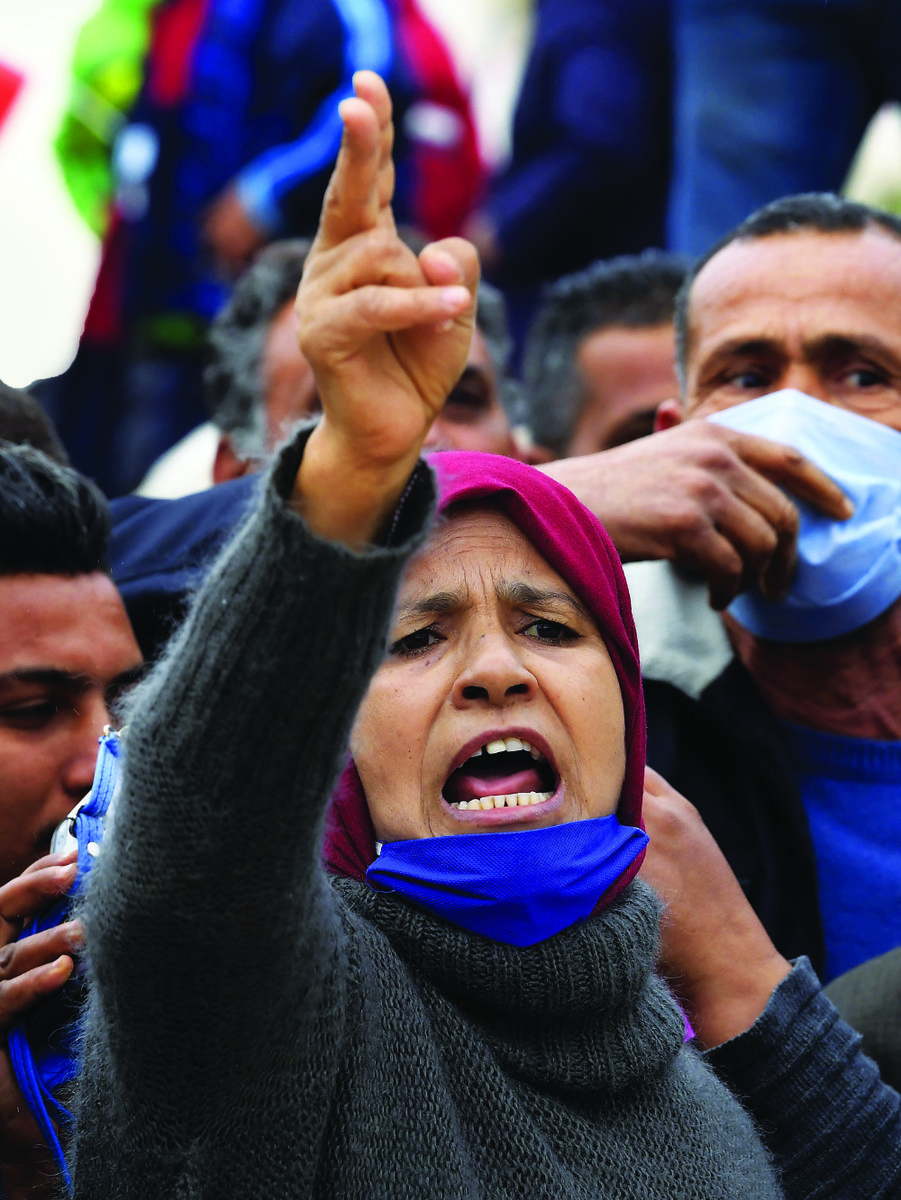DUBAI: Hasna Worshafani, a Dubai-based paralegal, had not been able to visit her parents in their native Tunisia for more than a year owing to COVID-19 air travel restrictions.
But just as the curbs began to be lifted, the North African country was struck by a devastating new wave of virus cases, forcing her to postpone her trip once again.
“The plan was to spend Eid Al-Adha with my parents, but because the situation back home is not okay, and there is a surge in the number of COVID-19 cases, I decided to put travel plans on hold until things settled a little,” Worshafani, a mother of two children, told Arab News.
Tunisia is among five African states in the throes of a devastating third wave of COVID-19 infections. The country, with a population of 11.69 million, has reported more than 18,600 deaths since the pandemic was declared in March last year.
On Sunday, hundreds of protesters rallied in the capital, Tunis, and other cities demanding the government’s resignation in the face of pandemic-linked economic and political troubles. By the end of the day, President Kais Saied had announced the suspension of parliament and the dismissal of Hichem Mechichi from the post of prime minister.
For months, as political squabbling paralyzed the government, hospitals struggled with oxygen shortages and a lack of staff and ICU beds, prompting Saudi Arabia, the UAE, France and Egypt among other countries to send emergency medical supplies and vaccine doses to Tunisia.
Authorities have also failed to implement a speedy vaccine rollout. Fewer than a million people — about eight percent of the population — have been fully vaccinated, even as the caseload has surged to one of the highest in Africa.
While there are several reasons for the uptick in COVID-19 cases, many Tunisians hold the Islamist Ennahda — the largest party in parliament — responsible for the deteriorating economic, social and health conditions since its entry into power in 2019.
Analysts say the shibboleths of democracy and pluralism that roll off the Islamists’ lips during election season may not assuage the public’s fears and anxieties stemming from the collapse of the health system and the parlous state of the economy.

One Tunisian expat said that lockdowns and travel bans became ‘unbearable for many people.’ (AFP)
Pointing to the scenes of jubilation that greeted the presidential announcement on Sunday night and the reports of attempts to storm Ennahda offices in multiple cities, the analysts say Tunisia’s Islamists will wait to see which way the political wind is blowing before flexing their muscles. In any case, the erosion of public support for democracy due to mass unemployment and declining state services is a fact that cannot be ignored.
Although Ennahda, along with leftists, supported Saied in the 2019 presidential election, their relations began to sour since the start of the pandemic. A prolonged deadlock between the president, the prime minister and the speaker of the parliament was seen as a major reason behind the government’s bungled response to the latest COVID-19 wave.
Mechichi, who was appointed head of government exactly one year ago, had overseen an unruly cabinet rocked by ministerial resignations and tensions with President Saied. As soaring COVID-19 cases swamped Tunisia’s hospitals, he sacked the health minister this month. But the move was seen by many as a case of too little too late.
None of this is to say politicians are solely to blame for the COVID-19 catastrophe in Tunisia. Similar to much of the world in the spring of 2020, the country implemented a full lockdown. The strategy proved extremely effective, with Tunisia reporting zero cases for a period of 40 days. But when the borders were reopened in June and tourists began to return, cases suddenly shot up.
Bureaucrats in much of North Africa failed to anticipate the impact of at least three factors when they decided to relax lockdowns or open up borders. The first is the high transmissibility of the delta variant, thought to have originated in India. The second is dwindling compliance with hygiene and social-distancing measures, and the third is the extremely low rate of vaccination.
“Different countries have different epidemiological situations, so we can’t generalize all of North Africa,” Abdinasir Abubakar, head of the Infectious Hazard Management Unit at the WHO regional office in Cairo, told Arab News.
He said some countries “invested so much in vaccination and this is paying off,” while others focused on enforcing public health measures to slow the spread of the virus.

Public anger over the lax government response to post-revolution security threats has haunted the ruling Ennahda party. (AFP)
However, poor compliance has been widely observed in Tunisia, contributing to a surge in cases of the delta variant. “That is actually what is driving the new surge of cases in North Africa, as well as other countries in the region,” Abubakar said.
To bring down the caseload, Abubakar wants the public to adhere to government restrictions on movement and mass gatherings.
“Governments need to reinforce restrictions. But, most importantly, people need to understand the reason why governments are imposing restrictions: Because of safety, health, and protection,” he said.
“People need to comply and respect that. They need to wear masks. They need to respect physical distancing. They need to promote handwashing and cleaning and they need to get vaccinated. They need to avoid any big social gatherings and travel.”
Abubakar is confident the situation in Tunisia and other African countries can be brought under control. For now, he is more concerned about the shortage of oxygen across the region.
“Literally, everywhere we are going through this. People are dying simply because there is not enough oxygen. We have never prioritized it and now this is something we need to do, and it is very easy to do as long as there is commitment and resources,” he said.
Worshafani, the Tunisian expat in Dubai, thinks the situation has deteriorated in her home country for one simple reason: Lockdowns and travel bans had become unbearable for many households.
“Authorities can’t impose a full lockdown for long, because the economy can’t take such a hit after peoples’ lives were badly affected by the lockdowns last year,” she said.
“The cost of living in Tunisia has steadily increased during the past 10 years. People have lost patience.”
Twitter: @jumanaaltamimi


























